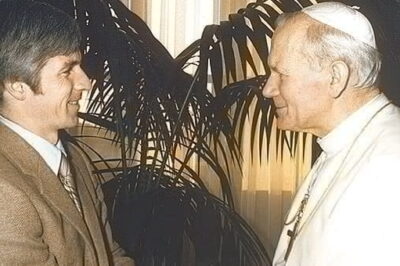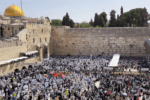Most people don’t know how warmly Pope John Paul II welcomed the renewal of the Holy Spirit. I saw his passion for God up close.
On October 16, 1978, I stood in St. Peter’s Square anticipating the announcement of the new pope. I could not have been more surprised when a Polish cardinal whom not many people had heard of came to the balcony and gave his first, spontaneous speech. His opening words: “Praised be Jesus Christ!” His main theme: “Do not be afraid. Open wide the doors to Christ!”
In the first year after the election of Pope John Paul II, Cardinal Léon-Joseph Suenens, archbishop of Brussels, Belgium, who was instrumental in helping the Roman Catholic Church respond positively to the charismatic renewal, arranged for the 10 members of the International Council of the Catholic Charismatic Renewal to spend an evening with the pope in the Vatican. We met in a room close to his private apartment and showed him a video chronicling the growth of the charismatic renewal throughout the world. After the video he asked us to arrange our chairs in a circle and share more with him.
Then he told us of his nearly lifelong relationship with the Holy Spirit:
“Let me first explain my own charismatic way. I have always been in this renewal in the Holy Spirit. … When I was a schoolboy, about 12 or 13 years old, I sometimes had difficulties in my studies, in particular with mathematics. My father gave me a prayer book, opening it to a page and saying to me: ‘You have here the prayer to the Holy Spirit. You must say this prayer every day of your life.’
“I am still obedient to this command my father gave me, and have been so now for nearly 50 years. … This was my own spiritual initiation, so I can understand all these different charisms. They are all part of the richness of the Lord.
“I am convinced that this movement is a sign of His action. The world needs so much this action of the Holy Spirit, and needs so many instruments of this action. I am convinced that this movement is a very important component of this entire renewal, this spiritual renewal of the Church.”
This was the first of many meetings that I and other leaders of the charismatic renewal had with John Paul II during the course of his 26 years as pope. He was very supportive of charismatic renewal and met dozens of times with renewal leaders to give encouragement and guidance.
He also made a point of personally encouraging me to “keep on [doing] what you’re doing.” But what is really significant is that he made every effort to help the whole church enter a deeper relationship with Christ, develop a greater openness to the Holy Spirit and make a renewed commitment to be a witness for Christ.
Emphasis on the Holy Spirit
Many recent news reports, articles and books devoted to the work of John Paul II have focused on his role in working for world peace, speaking for the poor and contributing to the collapse of communism. They have for the most part overlooked the fact that the core of his life and mission was to witness to the glory and truth of the Father, Son and Holy Spirit.
In 1986 the pope devoted an entire document, Dominum et Vivificantem (“Lord and Giver of Life”), to the work of the Holy Spirit and in it gave profound teaching about the role of the Spirit in revealing Jesus, bringing about personal transformation and empowering for mission. He had a vivid sense of the contemporary action of the Holy Spirit and the need for the church to again “encounter the Spirit.”
John Paul II spoke of the Holy Spirit as the one who is “at the center of the Christian faith and is the source and dynamic power of the Church’s renewal.” He underlined the importance of the pouring out of the Spirit at Pentecost for the transformation of the apostles and the launching of the church’s mission. In light of the rise of an international pagan culture that was displacing the traditional Christian culture of many nations, he realized that what was most needed for the church was a renewal of the experience of Pentecost.
In his address at the beginning of the new millennium (January 6, 2001), he said: “Over the years, I have often repeated the summons to the new evangelization. I do so again now, especially in order to insist that we must rekindle in ourselves the impetus of the beginnings and allow ourselves to be filled with the ardour of the apostolic preaching which followed Pentecost.”
His vision of the Christian life was of every believer in a living relationship of discipleship to Christ, participating in the saving work of Christ, attentive to and responsive to the moving of the Spirit. He knew that, faced with the conflict between good and evil every person experiences both in his own heart and in today’s culture, only the “one who welcomes the gift,” speaking of the gift of the Spirit, can overcome.
In 1998, John Paul II made the remarkable statement in his Incarnationis Mysterium (“The Mystery of the Incarnation”) that from the beginning of his service as pope 20 years earlier he had looked forward to the year 2000 “with the sole purpose of preparing everyone to be docile to the working of the Spirit.” He asked the entire church to focus on the person and work of the Holy Spirit for all of 1998, and on the eve of Pentecost, he invited all the renewal movements in the church to join him to celebrate this feast of the outpouring of the Holy Spirit.
More than 500,000 people from all over the world, representing more than 50 different renewal movements, gathered together to hear his words:
“With the Second Vatican Council [the 21st ecumenical council of the Roman Catholic Church, convened in 1962 by Pope John XXIII], the Comforter recently gave the Church … a renewed Pentecost, instilling a new and unforeseen dynamism.
“Whenever the Spirit intervenes, he leaves people astonished. He brings about events of amazing newness; he radically changes persons and history. This was the unforgettable experience of the Second Vatican Ecumenical Council during which, under the guidance of the same Spirit, the Church rediscovered the charismatic dimension as one of her constitutive elements: ‘It is not only through the sacraments and the ministrations of the Church that the Holy Spirit makes holy the people, leads them and enriches them with his virtues. Allotting his gifts according as he wills (cf. 1 Cor. 12:11), he also distributes special graces among the faithful of every rank. … He makes them fit and ready to undertake various tasks and offices for the renewal and building up of the Church’ (Lumen gentium, n.12).”
John Paul II acknowledged that the charismatic workings of the Holy Spirit are an essential and complementary reality to the sacramental and hierarchical dimensions of the church’s existence and that a special action of the Holy Spirit in the Second Vatican Council was required to bring the church back to an awareness of their importance.
The pope continued: “The institutional and charismatic aspects are co-essential … to the Church’s constitution. They contribute … to the life, renewal and sanctification of God’s people. It is from this providential rediscovery of the Church’s charismatic dimension that before and after the Council, a remarkable pattern of growth has been established for ecclesial movements and new communities. … You present here are the tangible proof of this ‘outpouring’ of the Spirit.”
The pope then made this extraordinary plea to all Christians: “Today, I would like to cry out to all of you gathered here in St. Peter’s Square and to all Christians: Open yourselves docilely to the gifts of the Spirit! Accept gratefully and obediently the charisms which the Spirit never ceases to bestow on us!”
A Charismatic Pope?
Sometimes people ask me if the pope was “charismatic.” John Paul II believed that every Christian was called to be charismatic–alive to the Holy Spirit, open to and obedient to His gifts, led by Him to carry out the work of evangelization. And he certainly modeled what he taught.
I remember being invited to his private chapel on a number of occasions. Every time I went he was already there, kneeling, lost in prayer. On some occasions he audibly “groaned” in the Spirit while in deep intercession.
He and his secretary encouraged us to sing and pray in the way those involved in the charismatic renewal were accustomed to. He was completely comfortable with both contemplative and charismatic modes of prayer.
Did he pray in tongues? I don’t know. But I do know that he was experiencing the depth of prayer in the Spirit described in Romans 8:26-27, which says that the Holy Spirit “intercedes for us with sighs too deep for words … according to the will of God” (RSV).
Pope John Paul II prophesied repeatedly that God is preparing a “new springtime of Christian life … if Christians are docile to the action of the Holy Spirit.”
We know of a few occasions on which he performed exorcisms for people who were demonically troubled. And after his death a Vatican City news service reported that one of the Italian cardinals, Francesco Marchisano, revealed that five years ago the pope prayed with him for healing of a serious throat ailment. The pope approached him after Mass, touched his throat, prayed for him and told him he would be healed.
“Soon after, I was cured,” Marchisano said. Others have claimed that there is a whole file of reports on healings that occurred through the prayers of John Paul II.
Clearly, this pope was a man of the Spirit who made a tremendous impact not only on the Catholic Church or the body of Christ, but also on the world. *
Ralph Martin teaches at Sacred Heart Seminary in Detroit. He is also president of Renewal Ministries, a Catholic mission organization devoted to renewal and evangelization. For more information log on at www.renewalministries.net.







Leave a Comment
You must be logged in to post a comment.